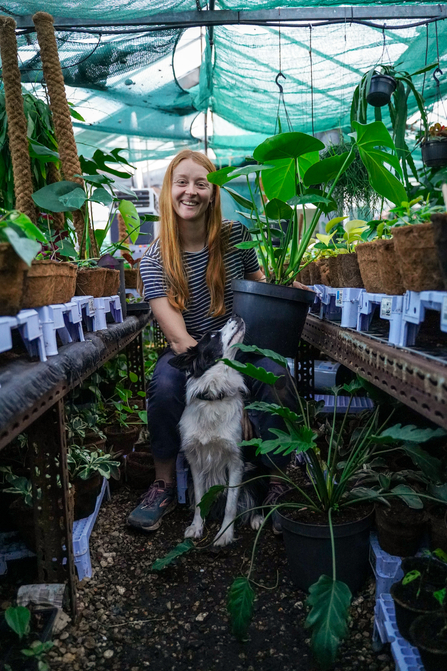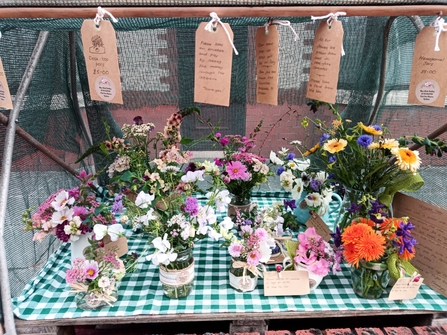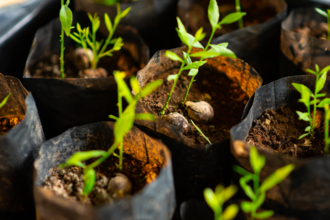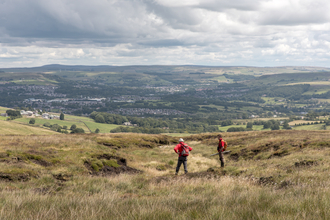Harriet Thompson is the founder of Harriet’s Plants, the UK’s only dedicated commercial grower of peat-free houseplants. “Being peat-free isn’t something that will ever change in my nursery. Doing my best as a person and as a grower is imperative to making this business work and for me to feel like I'm not damaging the environment whilst I grow.”
Making peat-free plants a reality
Peat-free plants at Bud Garden Centre - credit Jenny Bennion

Harriet Thompson grows and sells peat-free houseplants at Harriets Plants - credit Harriet Thompson
But as a small, independent nursery who has only ever grown peat-free, does this make it easier for Harriet to supply the plants that she loves whilst sticking to her strongly sustainable ethos? “I think if you own a nursery that grows in peat it's absolutely a challenge to then go over to a growing media that potentially doesn't hold water in the same way that peat-based composts do.”
Margaret and Mike Dickinson are traditional market gardeners running Lyndene Nursery in Tarleton growing tomatoes and experimenting with adding a cut-flower and cottage garden annuals arm to their business. Whilst being committed to transitioning to being fully peat-free, they have faced challenges making the numbers add up.

Peat-free flowers at the Lyndene Nursery pop-up shop - credit Margaret Dickinson
“We have found that there is a reliable peat-free substitute for growing on our young tomato plants, but this costs around £2 per bag more.” And when it comes to finding the perfect growing media for germinating the tomato seeds the numbers are all over the place. Margaret is currently trialling different peat-free seed compost brands, one of which costs more than two and a half times more than a peat-based compost.
For Margaret the problem comes as, “There are not many small-scale horticulturalists now and the large-scale producers still want peat... This means there isn't the demand at wholesale level for such large quantities of peat-free, which results in higher prices per unit and less choice.”
Peat-free plants and compost at Bud Garden Centre - credit Jenny Bennion
Brenda Smith runs Bud Garden Centre, a boutique garden centre in Burnage, Manchester. She only sells peat-free bagged composts and raises all of her own plants 100 per cent peat-free. However, being unable to grow everything herself, she struggles to buy in some peat-free shrubs and climbers.
“As a small grower, I don’t have the power to implement large scale change. The massive garden centre chains could put more pressure on their growers, but currently they are simply not doing so.”
But Brenda is passionate and has been at the forefront of peat-free growing for years. “I started doing an organic gardening course 18 years ago and when I started off peat-free growing was going against the trend.”
But I just couldn’t use peat now. I’d rather use nothing than use peat.Bud Garden Centre
“The first thing that we need to do is to bust the myth that peat-free doesn’t work”, Brenda continues. She has long been supportive of a ban of the use of peat in horticulture, as is currently being considered by the English and Welsh governments. However, if a ban on the retail sales of peat comes in by 2024, she can see some issues with the supply of peat-free alternatives, as the growing media industry simply hasn’t made the move to peat-free soon enough.
Peat-free plants at Bud Garden Centre - credit Jenny Bennion
However, there are steps that we can all take to help mitigate this says Brenda, “The key is using your compost sensibly. Never buy a bag of compost and use it as a mulch, it’s just a waste when some good manure will do a much better job. Also, if possible get plants in the ground, they rarely need any extra compost and will be much happier than in a pot.
“Buy a lovely bag of peat-free compost and use it sparingly, mix it with your own homemade compost if possible for filling containers and don’t be afraid to recycle used compost – most bulbs, for example, will fare perfectly well in last year’s compost.”
It seems clear that much of the horticultural industry simply isn’t committed to making a fast transition to peat-free growing, making life harder for those who are. However, it’s not all doom and gloom.
Little Woolden Moss during commercial peat extraction for use in the horticultural industry
“I know it all sounds a bit negative, but we're actually really excited about being peat-free, although totally dependent on people wanting to support us”, says Margaret Dickinson.
Harriet Thompson adds, “More and more people are campaigning and shouting about peat-free now which makes the final customer question whether they can find the plant peat-free instead.”
Quite simply, we know that a change is coming, and everyone at home can do their bit. The more people that make the decision to only buy peat-free plants, the more pressure will be put on the big growers now. Maybe it will take legislation to get us to 100 per cent peat-free gardening, but in the meantime find your local peat-free suppliers and support them.
You can find loads of hints and tips on going peat-free in our Peat Action Pack.



